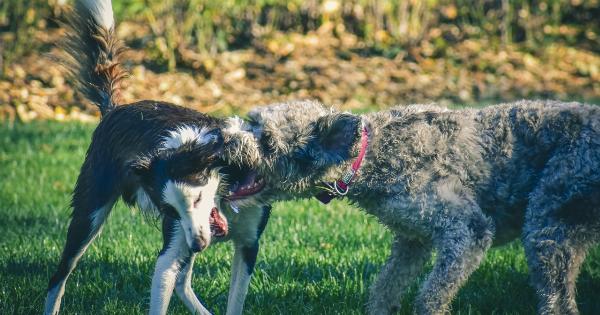A well-balanced diet is essential for a dog’s overall health and well-being. It plays a crucial role in maintaining their physical and mental health, as well as impacting their behavior.
Canine aggression is a complex issue that can be influenced by various factors, and diet is one of them. In this article, we will explore the key factors to consider regarding diet and canine aggression.
1. Nutritional Deficiencies
One of the primary factors to consider when it comes to diet and aggression in dogs is nutritional deficiencies. When a dog’s diet lacks essential nutrients, it can lead to physical and mental imbalances, which may manifest as aggressive behavior.
Certain vitamins and minerals, such as vitamin B6, magnesium, and omega-3 fatty acids, play a crucial role in brain health and mood regulation. Ensuring your dog receives a complete and balanced diet is fundamental in preventing nutritional deficiencies and their potential consequences.
2. Food Allergies and Sensitivities
Food allergies and sensitivities can also contribute to canine aggression. When a dog consumes ingredients they are allergic or sensitive to, it can trigger an inflammatory response, affecting their overall well-being.
This inflammation can impact the dog’s behavior, potentially leading to increased irritability and aggression. Identifying and eliminating any problematic ingredients from your dog’s diet is essential in managing aggression related to food allergies or sensitivities.
3. Feeding Routine and Schedule
The timing and routine of feeding can also influence a dog’s behavior. Inconsistent or irregular feeding schedules can create anxiety and stress in dogs, which may result in aggressive behaviors.
Establishing a consistent feeding routine with regular mealtimes can provide a sense of security and stability for your dog, potentially reducing the likelihood of aggressive outbursts.
4. Quality and Type of Food
The quality and type of food you feed your dog can significantly impact their behavior. Low-quality commercial dog foods that contain artificial additives, preservatives, and fillers may contribute to behavioral issues, including aggression.
Opting for high-quality, natural, and balanced diets that are free from artificial ingredients can support your dog’s overall well-being and potentially reduce aggressive tendencies.
5. The Role of Protein
Protein is a crucial nutrient for dogs, as it provides essential amino acids necessary for various bodily functions. However, the source and amount of protein in a dog’s diet can influence their behavior.
Excessive protein consumption, particularly from poor-quality sources, can lead to hyperactivity and restlessness, potentially escalating aggressive behavior. On the other hand, a balanced protein intake derived from high-quality sources can support your dog’s physical and mental health, promoting a calmer demeanor.
6. Caloric Balance
Maintaining a proper caloric balance is vital for dogs to prevent weight-related issues and potential behavior problems. Both obesity and inadequate calorie intake can contribute to aggression in dogs.
Obesity can lead to various health concerns, discomfort, and decreased overall well-being, which may manifest as aggression. Conversely, insufficient calorie intake can cause irritability and increased stress levels, potentially triggering aggressive responses.
Consult with your veterinarian to determine the appropriate caloric intake for your dog based on their size, age, and activity level.
7. Supplements and Behavioral Support
In some cases, integrating certain supplements into your dog’s diet can provide additional support in managing aggression.
Natural supplements such as chamomile, valerian root, or CBD oil have calming properties that may help reduce anxiety and promote relaxation. However, it is important to consult with a veterinarian before introducing any supplements to ensure proper dosage and suitability for your dog.
8. Mealtime Environment
The environment in which your dog eats can also impact their behavior. Mealtime stress or competition with other animals during feeding can create anxiety and lead to aggressive behavior.
Providing a quiet and peaceful mealtime environment, where your dog feels safe and comfortable, can help reduce stress levels and minimize aggression during feeding.
9. Behavioral Training and Consistency
While diet plays a significant role in canine aggression, it is essential to address any underlying behavioral issues through training and consistency. A dog’s behavior is influenced by various factors, and diet is just one piece of the puzzle.
Training, socialization, and consistent reinforcement of desired behaviors are crucial in managing and preventing aggression in dogs.
10. Seeking Professional Advice
If your dog displays aggression or you have concerns about their diet and behavior, it is crucial to seek professional advice. Your veterinarian or a certified animal behaviorist can provide expert guidance tailored to your dog’s specific needs.
They can help assess the situation, identify any potential dietary or behavioral issues, and develop a comprehensive plan to manage and improve your dog’s behavior.
Conclusion
Proper nutrition is vital not only for a dog’s physical health but also for their behavior and mental well-being.
Considering the key factors relating to diet and aggression in dogs, such as nutritional deficiencies, food allergies and sensitivities, feeding routines, food quality, protein balance, caloric intake, and the mealtime environment, can help address and prevent aggressive behavior. Remember, a holistic approach that includes proper nutrition, behavioral training, socialization, and seeking professional advice when necessary is essential to ensure your dog’s overall happiness and well-being.




























